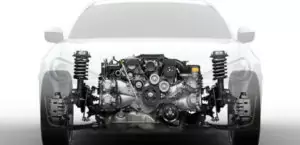The 1.6-liter Chevrolet F16D4 or LDE engine was assembled in South Korea from 2008 to 2020 and put on the two most popular models of the Asian division of the concern: Aveo and Cruze. This power unit is almost a complete analogue of the famous Opel Z16XER engine.
First of all, these engines were distinguished by the presence of phase regulators of the DCVCP type on the intake and exhaust, but otherwise their design was classic for that time: a cast-iron cylinder block, an aluminum 16-valve head without hydraulic compensators and a conventional timing belt drive. The plastic intake manifold was equipped with a proprietary VGIS geometry change system.
Initially, such a unit had an LDE index, a compression ratio of 10.8 and developed 113 hp and 152 Nm, but two years later a version of the LXV appeared with a compression ratio of 11.0, developing 124 hp and 154 Nm.
The F series also includes engines: F14D3, F14D4, F15S3, F16D3, F18D3 and F18D4.
The engine was installed on:
- Chevrolet Aveo T300 in 2011 – 2020;
- Chevrolet Cruze 1 (J300) in 2008 – 2016.
Specifications
| Production years | 2008-2020 |
| Displacement, cc | 1598 |
| Fuel system | distributed injection |
| Power output, hp | 113 / 124 |
| Torque output, Nm | 152 / 154 |
| Cylinder block | cast iron R4 |
| Block head | aluminum 16v |
| Cylinder bore, mm | 79 |
| Piston stroke, mm | 81.5 |
| Compression ratio | 10.8 / 11.0 |
| Features | no |
| Hydraulic lifters | no |
| Timing drive | belt |
| Phase regulator | DCVCP intake and exhaust |
| Turbocharging | no |
| Recommended engine oil | 5W-30 |
| Engine oil capacity, liter | 4.5 |
| Fuel type | petrol |
| Euro standards | EURO 4/5 |
| Fuel consumption, L/100 km (for Chevrolet Cruze 2012) — city — highway — combined |
8.8 5.1 6.5 |
| Engine lifespan, km | ~350 000 |
| Weight, kg | 115 |
Disadvantages of the F16D4 engine
- The most famous problem with this engine is the failure of the phase regulators. In the early years, they were often changed under warranty even up to 30,000 km, but later the resource grew. Even from low-quality oil, the grids of solenoid valves can become clogged here.
- Another weak point of this power unit is the oil heat exchanger, which flows in both directions: that is, the oil here enters the coolant, and vice versa, antifreeze gradually dilutes the lubricant, leading to wear on the oil pump.
- A lot of trouble is caused by regular electrical failures. Most often, the ECU is buggy, and it’s not always a matter of the board, its connectors can also burn out, the electronically controlled thermostat and the ignition coil module regularly fail.
- Also in this motor, the membrane of the crankcase ventilation valve often collapses, oil constantly oozes through the seals, and it also bends the valve when the timing belt breaks. And do not forget about adjusting the thermal clearances of the valves, there are no hydraulic lifters here.






